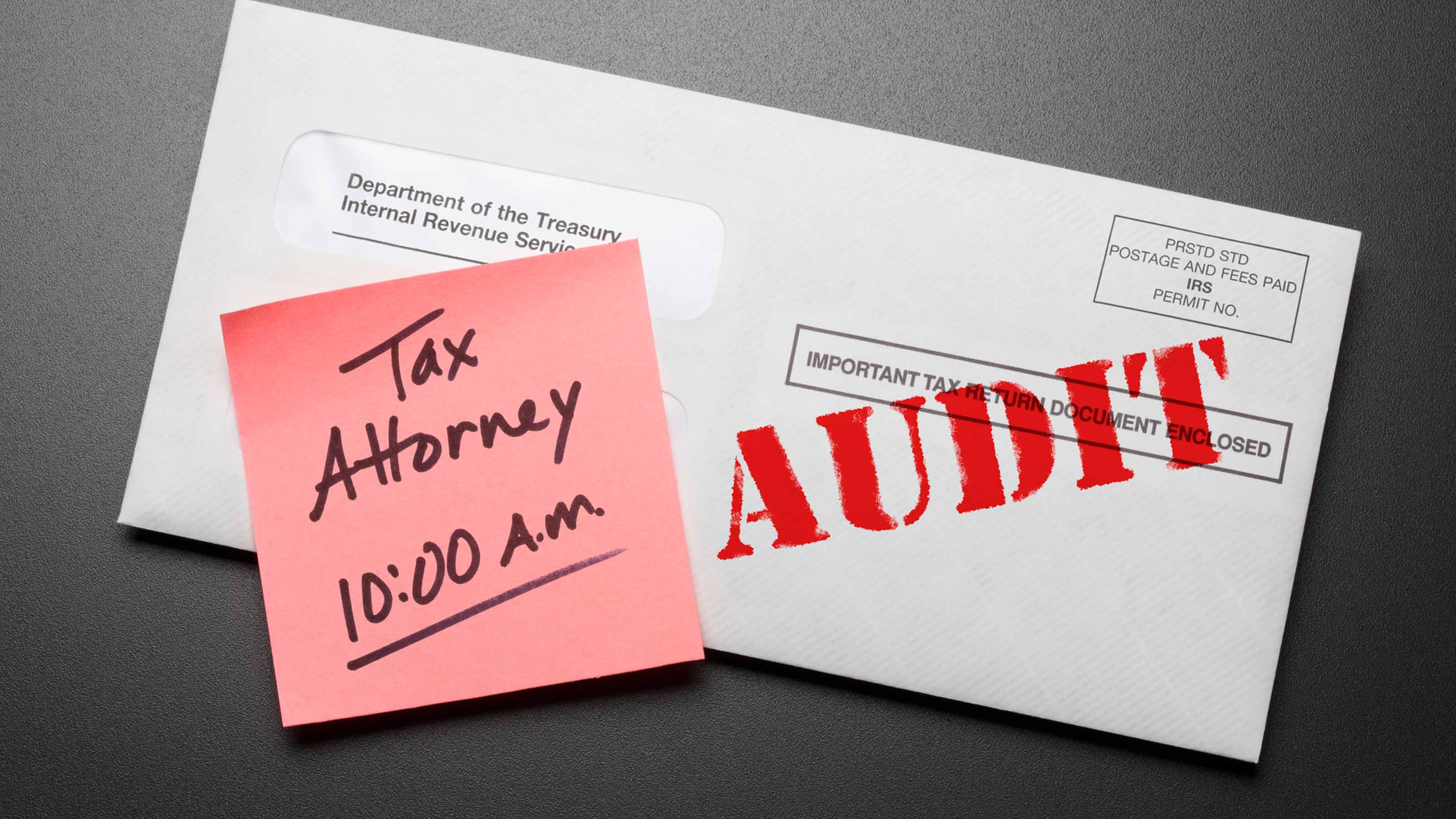So You Got a Letter from the IRS
Before you panic and assume the worst – such as a full-blown audit – take a breath. It may be nothing. Follow these steps to start figuring out what’s up.


Profit and prosper with the best of Kiplinger's advice on investing, taxes, retirement, personal finance and much more. Delivered daily. Enter your email in the box and click Sign Me Up.
You are now subscribed
Your newsletter sign-up was successful
Want to add more newsletters?

Delivered daily
Kiplinger Today
Profit and prosper with the best of Kiplinger's advice on investing, taxes, retirement, personal finance and much more delivered daily. Smart money moves start here.

Sent five days a week
Kiplinger A Step Ahead
Get practical help to make better financial decisions in your everyday life, from spending to savings on top deals.

Delivered daily
Kiplinger Closing Bell
Get today's biggest financial and investing headlines delivered to your inbox every day the U.S. stock market is open.

Sent twice a week
Kiplinger Adviser Intel
Financial pros across the country share best practices and fresh tactics to preserve and grow your wealth.

Delivered weekly
Kiplinger Tax Tips
Trim your federal and state tax bills with practical tax-planning and tax-cutting strategies.

Sent twice a week
Kiplinger Retirement Tips
Your twice-a-week guide to planning and enjoying a financially secure and richly rewarding retirement

Sent bimonthly.
Kiplinger Adviser Angle
Insights for advisers, wealth managers and other financial professionals.

Sent twice a week
Kiplinger Investing Weekly
Your twice-a-week roundup of promising stocks, funds, companies and industries you should consider, ones you should avoid, and why.

Sent weekly for six weeks
Kiplinger Invest for Retirement
Your step-by-step six-part series on how to invest for retirement, from devising a successful strategy to exactly which investments to choose.
Uh-oh.
You’re flipping through your mail and the return address on one letter makes your heart rate quicken — and not in a good way. It’s from the Internal Revenue Service.
When you open the envelope you see what you dreaded most: The IRS wants to audit your return. (Don’t think it can’t happen to you. The IRS seems to have gotten back to work after a spring lull, and I’ve recently gotten several frantic calls from clients who have received audit notices.)
From just $107.88 $24.99 for Kiplinger Personal Finance
Become a smarter, better informed investor. Subscribe from just $107.88 $24.99, plus get up to 4 Special Issues

Sign up for Kiplinger’s Free Newsletters
Profit and prosper with the best of expert advice on investing, taxes, retirement, personal finance and more - straight to your e-mail.
Profit and prosper with the best of expert advice - straight to your e-mail.
Your mind races, and your palms sweat. Did you do something wrong? Did you leave anything out? Why are they coming after you? How are you going to be able to defend yourself against the United States government?
Let me offer the most straightforward piece of advice I can: Take a deep breath, exhale slowly and set the letter aside. Do something else for a while. Finish some chores. Walk the dog. Go for a run. Once you’ve calmed down, you can focus on the letter.
Did the IRS make a mistake (not you)?
For starters, there’s a chance the IRS flubbed. Remember, it’s a massive government agency handling millions of tax returns. It’s understaffed, underfunded and staffers are overworked. They can — and do — make mistakes. You or your tax preparer could also slip up. The agency sent out about 1.9 million notices about math errors last year on 2018 returns. Maybe yours is one of those.
An IRS reviewer may also have missed seeing your correct information in the spot they thought it should have been in, even if you included it elsewhere on your return. They may not have applied a payment that you already made. They may have transposed some numbers or gotten a date wrong. Believe me, it happens.
Pull out your tax return and check for those clerical errors first. After that, thoroughly review the letter.
What year is the IRS reviewing? What exactly are they asking for? What are they claiming is missing from your return?
Letters resulting from a 1099 audit often include a “notice of proposed adjustment.” The “adjustment,” of course, is the additional money the IRS says you owe them, including the penalty and interest that’s been assessed.
An IRS letter may also state your tax return has been chosen for an additional investigation or audit, and it may give specific categories the agency wants to review from either a business or the taxpayer’s personal records.
This is where taxpayers’ hearts begin palpitations, and there’s a simple reason why: Most don’t have a clue about what’s actually in their return because they hire others to do it, and sign off without reading it. Given that professional tax experts sometimes miss details, it’s likely laypeople miss them as well.
Misread, overlooked, unclear
Chances are there’s a logical explanation that addresses the IRS’ concerns.
Send your tax preparer a copy of the IRS letter and ask for an explanation. There’s an excellent chance they will have answers that will satisfy the IRS. If you prepared your return yourself, look for the same issues a preparer would: A date may have been misread, information that is being requested was, in fact, included in the return or the time period wasn’t clear.
The IRS is not in the business of chasing people for amounts that aren’t due. If they’re satisfied you’ve paid what you owe, they will move on. Be patient as this may take some time to work through with the IRS. You will often wait for replies from the department for months at a time.
If there are remaining issues, there’s a good chance they may be a consequence of tax items from a prior year that impacted the current year’s return. This means the IRS may be scrutinizing whether you incorrectly applied tax deductions or credits disallowed on previous returns to the current year. They make more tax revenue if carry forwards can be disallowed, so of late they have asked taxpayers to provide the original source information for the deduction or credit, even though the statute of limitations related to that particular item may have long since passed.
President Donald J. Trump, for example, is the midst of a battle with the IRS over a $72.9 million tax refund claimed and received after prior losses.
Remember: Credit card receipts don’t count
To address these questions — now and in case of future audits — keep your receipts and records for six years at a minimum.
And this is crucial: The IRS does not accept credit card receipts in an audit. Even if you regularly use a company credit card to pay business expenses, the IRS requires the original vendor receipt. This is one of the most common errors I see among my clients.
I strongly recommend getting an app that allows you to take a picture of the original receipt using your phone and maintain a record of all the receipts on your credit card. At the end of the year, you can download a PDF report that is easily archived.
Keep contemporaneous records along with the receipts to indicate how each expense benefits the business in case you’re called on to justify it.
It’s entirely possible the dreaded audit letter can be resolved relatively painlessly. Just never forget the IRS is always trying to collect money. It is not trying to reduce your tax bill to the lowest amount legally possible. Mistakes they notify you of will almost always be in their favor.
When you have stellar records, you know you’ll be able to resolve what is often a small error. And your heart won’t race (as much) when you see that dreaded envelope in the mailbox.
Profit and prosper with the best of Kiplinger's advice on investing, taxes, retirement, personal finance and much more. Delivered daily. Enter your email in the box and click Sign Me Up.

Bruce Willey has been working with small to midsize businesses across the country for more than a decade, helping them navigate business and tax law in a variety of situations. His services include assisting with business start-ups, operations, growth, asset protection, exit planning and estate planning.
-
 Nasdaq Leads a Rocky Risk-On Rally: Stock Market Today
Nasdaq Leads a Rocky Risk-On Rally: Stock Market TodayAnother worrying bout of late-session weakness couldn't take down the main equity indexes on Wednesday.
-
 Quiz: Do You Know How to Avoid the "Medigap Trap?"
Quiz: Do You Know How to Avoid the "Medigap Trap?"Quiz Test your basic knowledge of the "Medigap Trap" in our quick quiz.
-
 5 Top Tax-Efficient Mutual Funds for Smarter Investing
5 Top Tax-Efficient Mutual Funds for Smarter InvestingMutual funds are many things, but "tax-friendly" usually isn't one of them. These are the exceptions.
-
 Social Security Break-Even Math Is Helpful, But Don't Let It Dictate When You'll File
Social Security Break-Even Math Is Helpful, But Don't Let It Dictate When You'll FileYour Social Security break-even age tells you how long you'd need to live for delaying to pay off, but shouldn't be the sole basis for deciding when to claim.
-
 I'm an Opportunity Zone Pro: This Is How to Deliver Roth-Like Tax-Free Growth (Without Contribution Limits)
I'm an Opportunity Zone Pro: This Is How to Deliver Roth-Like Tax-Free Growth (Without Contribution Limits)Investors who combine Roth IRAs, the gold standard of tax-free savings, with qualified opportunity funds could enjoy decades of tax-free growth.
-
 One of the Most Powerful Wealth-Building Moves a Woman Can Make: A Midcareer Pivot
One of the Most Powerful Wealth-Building Moves a Woman Can Make: A Midcareer PivotIf it feels like you can't sustain what you're doing for the next 20 years, it's time for an honest look at what's draining you and what energizes you.
-
 I'm a Wealth Adviser Obsessed With Mahjong: Here Are 8 Ways It Can Teach Us How to Manage Our Money
I'm a Wealth Adviser Obsessed With Mahjong: Here Are 8 Ways It Can Teach Us How to Manage Our MoneyThis increasingly popular Chinese game can teach us not only how to help manage our money but also how important it is to connect with other people.
-
 Looking for a Financial Book That Won't Put Your Young Adult to Sleep? This One Makes 'Cents'
Looking for a Financial Book That Won't Put Your Young Adult to Sleep? This One Makes 'Cents'"Wealth Your Way" by Cosmo DeStefano offers a highly accessible guide for young adults and their parents on building wealth through simple, consistent habits.
-
 Global Uncertainty Has Investors Running Scared: This Is How Advisers Can Reassure Them
Global Uncertainty Has Investors Running Scared: This Is How Advisers Can Reassure ThemHow can advisers reassure clients nervous about their plans in an increasingly complex and rapidly changing world? This conversational framework provides the key.
-
 I'm a Real Estate Investing Pro: This Is How to Use 1031 Exchanges to Scale Up Your Real Estate Empire
I'm a Real Estate Investing Pro: This Is How to Use 1031 Exchanges to Scale Up Your Real Estate EmpireSmall rental properties can be excellent investments, but you can use 1031 exchanges to transition to commercial real estate for bigger wealth-building.
-
 Should You Jump on the Roth Conversion Bandwagon? A Financial Adviser Weighs In
Should You Jump on the Roth Conversion Bandwagon? A Financial Adviser Weighs InRoth conversions are all the rage, but what works well for one household can cause financial strain for another. This is what you should consider before moving ahead.